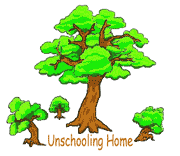"But what about these adults who can't read?
How did that happen, if
reading is inevitable, lessons or no lessons?"
Reading is inevitable in a nuturing atmosphere where the person sees a need to read.Pam Hartley, same question:Adult non-readers are almost universally schooled and may come from homes where reading wasn't valued or was looked down on.
The single biggest factor I believe in kids not reading is pressure to read too early. They pick up that they are dumb because they can't do what "everyone else" can. So many decide they're too dumb to read or, to protect their self-esteem, that reading itself is dumb.
Teachers, even specialists in a particular field of learning, are experts *only* on schooled kids who have school goals to meet by a specific age. They don't realize that those kids aren't natural kids. They don't realize that school is a huge contributing factor in the children's behavior because school, like oxygen, is apparently universal. They have no idea what a natural child is like.
Joyce
8/29/03
Unschooling Discussion List
Reading isn't inevitable, lessons or no lessons. It is entirely possible (and done in schools and school-at-home families every day) to suck the joy out of learning to read (or anything else), sometimes to the point where the child simply refuses on every level to have anything to do with something that is being made to be a torture.It is also very likely that if an unschooled child lived somewhat isolated in a non-reading family that also banned video games and television (because there is so much reading involved in both those media outlets these days) they would not learn to read.
Reading isn't Athena, springing full-sized from the head of Zeus in a ta-da! overblown Greek romance. It's simply as natural as learning to ride a bike in a bike-riding family, or learn to train a dog in a dog-training family, or learn to cook in a family that eats their meals at home.
Pam
From Some Thoughts About Late Reading, Sandra Dodd, late 2014
Schools can persuade young children that they are so far behind they will never catch up. Schools can make it true. Schools can beat down a hopeful child in such a way that he will cringe at the sight of books or libraries for seventy years, if he lives that long. They have done it a million times.Y'know when people say "Don't try this at home"?
Homeschoolers can do the same kind of damage school does, if they are not Very Careful not to.I have not seen an unschooler fail to read. Enthusiasm and pride will accompany the moment the child can read, regardless of the age, if parents don't screw it up.
Before a child can read, He Cannot Read. Lessons and pressure won't help. It's not making sense yet. One day the marks become words, IF he has not been pressured and shamed, rushed and blamed.
When Holly could read Stephen King, it was partly because she had a large vocabulary. She knew the words when she saw them. We weren't limiting her world to "first grade material" when she was six and "second grade material" when she was seven. She was in situations and conversations with people of many ages, about real-world things. She watched movies and television shows, heard things read, that were not designed for "her grade level," because she never had a grade level. She was living in the world. And when she read, she read as real people read.
